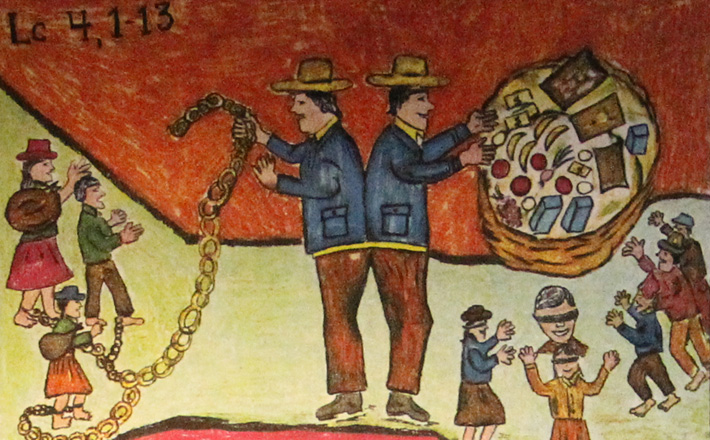Commentary on Psalm 91:1-2, 9-16
Psalm 91 is the second psalm in Book Four of the Psalter.
It is classified as an Individual Hymn of Thanksgiving, in which an individual praises God for goodness to or on behalf of that individual, usually for a deliverance from some trying situation. Hermann Gunkel, the great form critic, describes the occasion on which these songs would have been offered to God, “A person is saved out of great distress, and now with grateful heart he [sic] brings a thank offering to Yahweh; it was customary that at a certain point in the sacred ceremony he would offer a song in which he expresses his thanks.” We are called to read Psalm 91, thus, in the context of a worshiper’s grateful praise for deliverance.
The opening verses of the psalm are filled with rich imagery, rich metaphor. The Bible attempts to describe the nature and character of God with words, words that are crafted by our ancestors in the faith as they sought to depict the creator, sustainer, ever-present God. We read in the Old Testament that God is judge, king, lover, holy, and so forth. How do each of us — how do you? — understand the concepts of judge, king, lover, holy being?
Readers often bring “narrow lens” of understanding to the biblical text through no fault of their own, but rather by way of the interpretations of their faith communities. As readers “widen their lens,” they may discover new ways of reading the biblical text that enrich their understanding of who God is and who they are in relationship to God and to others. One metaphor for God will not do. The beauty of metaphoric imagery for God in the biblical text is that it allows for a multiplicity of conceptualizations, or as one scholar states, “a vast collection of interwoven images.” To achieve a full understanding of God, we must tune our ears and focus our eyes to hear and see other images, other metaphors than to ones we have always seen and heard.
The opening verses of Psalm 91 speak of God’s presence with and protection of the psalm singer as “the shelter … the shadow … my refuge … fortress” and uses four names for God — “Most High — Elyon,” “Almighty — Shaddai,” “LORD — Yahweh,” and “God — Elohim.” Elyon and Shaddai were common epithets for God in the Old Testament. Elyon appears eight times in the Pentateuch and nineteen times in the book of Psalms. Its root is the Hebrew verb ‘alah, and means “to go up, to ascend.” God is the great God, transcending all other devotions.
Shaddai is more interesting to this commentator because of its rich nuances of meaning and its more “earthly” connotations. The Hebrew root word is shad, which means either “mountain” or “breast.” References that tie nurturing breasts to God and God’s goodness occur over thirty times in the Hebrew Bible. Genesis 49:25 (the poem of Jacob’s blessings of his sons — in this instance Joseph) connects the blessing of Shaddai with the breasts (shaddaim) and the womb. In Isaiah 66:11, Zion is a “consoling breast” (shad). And Naomi states in Ruth 1:20-21, “Shaddai has dealt bitterly with me and brought calamity upon me,” — a reflection perhaps on her now “barren” state. If we understand the metaphor for God in Psalm 91:1 as a feminine metaphor, we might come to a new understanding of the whole psalm.
In verse 2, we read that God is “my refuge” and “my fortress.” While these words are most often interpreted as having to do with “fleeing from an enemy” and “safe haven under attack,” if we read them as the words of protection and safe haven that a mother (or a parent) provides, we “bring the words down to earth — down to everyday life,” so to speak. The basic meaning of the word that is translated as “refuge” is “to cover, to hide” (Hebrew chasah), and fits well with verse 4, that states, “God will cover you with pinions and under God’s wings you will find refuge.” Recall also that in Matthew 23:37, Jesus lamented, “How often have I desired to gather your children together as a hen gathers her brood under her wings!”
With this metaphoric image — God as feminine, as the motherly figure feeding and protecting her children — in mind, let us move to verses 9-16 of Psalm 91. Here we read that God will provide extraordinary protection to the one who seeks refuge in God. Verse 11, of course, was taken up by the composers of the gospels of Matthew and Luke (Matthew 4:6; Luke 4:10-11) as a reference to Jesus, but in the greater context of Psalm 91, we may interpret these words as the caring protection a parent gives to a child whom they have conceived, born, and nurtured.
The closing words of Psalm 91 are rich with promise to those who love the parent who has nurtured them. The mother (and father) God will bless, protect, answer, be present in times of trouble, rescue, honor, and grant long life and salvation.
The season of Lent is a preparation of hearts, minds, and bodies for the crucifixion and resurrection of Jesus, the embodiment of God in this world. We are called to give our best, as the Lectionary reading from Deuteronomy 24 emphasizes. How do we do that? We must remember in this time of sacrifice that God is ever-present, manifesting Godself as mother, father, brother, sister, and yet holy other. Embrace the nurturing mother image of God as solid refuge in this season of preparation.


February 14, 2016